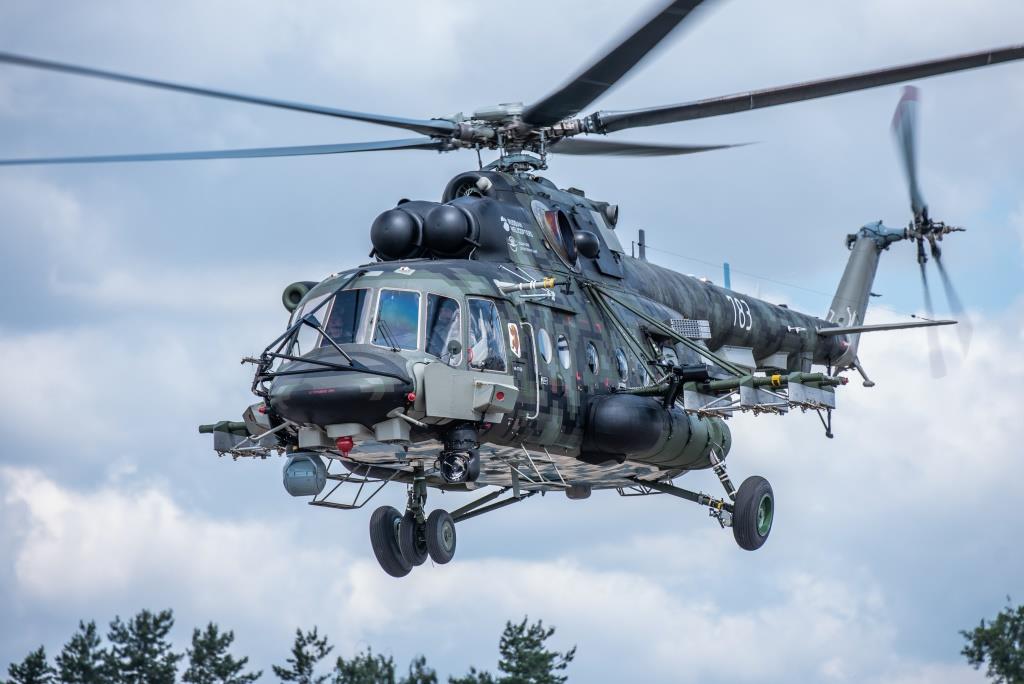
Russia to Offer Africa More Military Equipment and Support
|
21 August 2022 21:48

By Kestér Kenn Klomegâh
Russia's Army Games factsheet, publicly distributed at the centrally coordinated information bureau, documented an increase in the annual purchases of military equipment by foreign clients including African countries. Our monitoring and research show that Russia has traditionally maintained good relations with north African countries especially Algeria and Egypt.
Besides
that, Central African Republic (CAR) and Republic of Mali are its
favourite partners after signing bilateral agreements on
military-technical cooperation. Inside Africa, many French-speaking
countries' relations have recently become strained with France due to
multiple factors including rift between Russia and France. There are
several indications that Russia has embarked on fighting neocolonial
tendencies in Africa.
Russia
has been keen to offer military support, including through selling
advanced weapons and military technology to those countries it considers
allies in Africa, and further in Asia and Latin America. During this
year's Army Games held in Kubinka, which is located approximately 280 km
outskirts of Moscow, the Russian Defence Ministry's officials held
separate talks with a number participating African countries on
strengthening their defence capabilities as part of military-technical
cooperation.
During
the Cold War, the Soviet Union provided huge quantities of military
equipment and weaponry to a number of African governments such as
Angola, Ethiopia and Mozambique. But, now ideology is not a significant
factor, the primary aim now for Russian business is to regain a
competitive edge in the global arms trade and the market. It's simply
business and nothing more, and Russia is using this military diplomacy
in order to gain stature and influence in Africa.
According
to sources, about ten African countries including Algeria, Congo,
Egypt, Nigeria, Sudan and Zimbabwe took part in the Army Games. The
Republic of Mali and the Central African Republic, where several
hundreds of military instructors from Russia's private military firm
Wagner Group were posted, participated the Army Games.
Brigadier
General Mike Nicholas Sango, Zimbabwean ambassador to the Russian
Federation, told me during discussions that "Russia's policy towards
Zimbabwe has over the last few years evolved in a positive way. Zimbabwe
government's engagement with the Russian Federation is historically
rooted in new state's contribution towards Zimbabwe attaining her
freedom and nationhood in 1980."
According
to him, the President of the Republic of Zimbabwe, Emmerson Dambudzo
Mnangagwa, visited Moscow in 2019. Since then, there have been
reciprocal visits by ministers and parliamentarians. In early June 2022,
the Chairperson of the Federal Council, Valentina Matviyenko, visited
Zimbabwe. Zimbabwe's military have participated in Army Games over the
years and in the mid-August 2022 Army Games.
Russian
Deputy Defense Minister Alexander Fomin held talks with Sudanese
Defense Minister Yassin Ibrahim to discuss the issue of strengthening
security in Africa. According to an official report, Deputy Defense
Minister of the Russian Federation Colonel General Alexander Fomin on
August 17 held a working meeting with the Defense Minister of the
Republic of Sudan, Lieutenant General Yassin Ibrahim.
It
further said that Russia is committed to further cooperation with Sudan
in strengthening security in Africa. The sides exchanged views on the
development of Russian-Sudanese military and military-technical
cooperation. The Sudanese minister reiterated the commitment of the top
leadership of the Republic of the Sudan to developing cooperation with
the Russian Federation in the military field. "We highly appreciate the
role of the Russian Federation in maintaining peace and security in the
world," Yassin Ibrahim said.
Russia
would also help strengthen the army and enhance the effectiveness of
its struggle against illegal armed groups in the French-speaking
Republic of Mali in West Africa. As expected, Fomin noted during
separate talks with Mali's Minister of Defense and Veterans Affairs,
Colonel Sadio Camara the importance of Russian-Malian cooperation and
confirmed the Russian Defense Ministry's readiness to continue the
constructive dialogue within the framework of the agreement signed on
military-technical cooperation.
In
addition to above, Russia has been partnering with Algeria and hopes to
step up arms sales to the North African country, Russia's armed forces
chief of staff told his visiting Algerian counterpart at the Army Games.
"We pledge to inject new energy into our bilateral relations in the
areas of military and technical cooperation," General Yuri Baluyevsky
told Algeria's General Salah Gaid, according to local news agencies.
Gaid,
a Russian speaker who was educated in the Soviet Union, was hosted by
the management of Rosoboronexport, the company that oversees most of
Russia's arms exports, as well as business leaders from the armament
sector. In addition to the $1,5-billion purchase of 50 Russian MiG 29
aircraft, currently under negotiation, the two countries could shortly
sign arms contracts worth about $500-million, Interfax news agency
quoted a defence ministry source as saying.
The
source said oil-rich Algeria, which currently accounts for three
percent of Russian arms exports, is considering acquiring fighter jets,
ships and ground weapons. Algeria, which had strong ties with the former
Soviet Union, has continued to purchase arms from Russia after the fall
of communism in 1991. Recent contracts between the two countries
covered the sale of 22 Su-24 Fencer aircraft, Kh-35 anti-ship cruise
missiles, transport helicopters and maintenance services for coastguard
ships, according to Interfax.
President
Vladimir Putin explained that Russia is ready to distribute advanced
weaponry across the globe, particularly in Africa, Asia and Latin
America. "Russia sincerely cherishes the historical strong, friendly,
truly trusting ties with the states of Latin America, Asia, and Africa
and is ready to offer its partners and allies the most modern types of
weapons," Putin said at the opening of the Army-2022 International
Military and Technical forum outside Moscow.
"From
small arms to armored vehicles and artillery, combat aircrafts and
unmanned aerial vehicles," Putin said and added that "almost all" of the
weapons he is willing to sell across the globe have been used more than
once in combat and claimed that the Russian-made products are superior
to those made by his foreign rivals.
"Many
of them are years, or maybe decades ahead of their foreign
counterparts, and in terms of tactical and technical characteristics
they are significantly superior to them," Putin reiterated. His speech
is available at the Kremlin website.
Russia
ranks second only to the United States with arms sales of around $15
billion a year, nearly a fifth of the global export market. From
2017-2021, 73% of those sales went to just four countries - India,
China, Egypt and Algeria - according to the Stockholm International
Peace Research Institute.
The
documents signed at the games cover a wide range of issues, including
supplies and maintenance of modern ground military equipment, drones,
radio-electronic and melee weapons. Several financial arrangements were
also made to ensure financing of developments and production of modern
military equipment samples. The orders from countries in Asia and
Africa, and the CIS became part of Rostec's portfolio of orders.
Arguably,
Dr Shaabani Nzori, a Moscow based Foreign Policy Expert, thinks that
Russia's military-technical cooperation with African countries is
appropriate in Russia's foreign policy but African leaders should also
allocate enough money to spend on priority development projects in
Africa.
"Over
these years Russia has highly prioritized the military sphere in
Africa. It shows clearly Russia's weak business engagement with Africa.
Until now, we can't point to completed Russian infrastructure projects
in Africa. There are many investment areas. What is important these days
is Russia has to go beyond just selling arms to Africa! Still, Russia
has the chance to transfer its technology to agriculture and industries
in Africa," Shaabani said in the interview discussion.
Our
monitoring and research show that African countries are interested in
military-technical cooperation. That military technical partnership
continues to evolve vigorously, African countries often initiate such
cooperation with the understanding to protect independence and
sovereignty, including from extremist and terrorist groups. In most
cases, African partners actively participate and get acquainted with
Russian advanced weapons, military hardware and experience of its use.
Our
monitoring further indicates that traditional importers of Russian
weapons from Africa include Algeria, Angola, Burkina Faso, Botswana,
Egypt, Ethiopia, Ghana, Libya, Morocco, Mozambique, Namibia, Rwanda,
Sudan, South Africa, Uganda and Zimbabwe. Russia is still exploring the
possibility of concluding agreements with a few more African countries.
"It
proved again that interest in our developments grows. There are more
and more negotiations regarding military-technical cooperation every
year, and we are actively working with our main customers. This year we
held meetings with Russian and foreign partners on the platform and
signed agreements," said Sergey Abramov, Industrial Director of Rostec
Corporation.
According
to Russia's military strategy, the main objective is to ensure that
Russia has a technological advantage in highly competitive global
markets. And that also include the introduction of a new techno-economic
paradigm and digitalization of Russian economy.
Rostec
Corporation is a state corporation that was established in 2007 to
facilitate the development, production and export of high-tech
industrial products designed for civilian and military applications. It
comprises over 700 organizations that are currently part of eleven
holding companies operating in the military-industrial complex and three
holding companies working in civilian industry, as well as over 80
directly managed organizations.
Rostec
Corporation's portfolio includes well-known brands such as Avtovaz,
Kamaz, Concern Kalashnikov, Russian Helicopters and UralVagonZavod.
Rostec companies are located in 60 constituent entities of the Russian
Federation and supply products to the markets of more than 100
countries.
Leave a comment
- Popular
- Rated
- Commented
04/11/2021 - 11:05:02
28/05/2024 - 15:44:10
02/12/2021 - 11:34:53
01/03/2021 - 09:00:37
Opinions
02/04/2025 - 18:34:53
27/02/2025 - 20:18:23
Politics
17/04/2025 - 01:58:17
13/04/2025 - 10:59:05
Terror Watch
24/04/2025 - 13:30:44
24/04/2025 - 13:07:46
20/04/2025 - 21:51:13
Press Releases
12/04/2025 - 10:30:34
03/04/2025 - 00:16:33
 0
0 



































Russia to Offer Africa More Military Equipment and Support
By Kestér Kenn Klomegâh Russia's Army Games factsheet, publicly distributed at the centrally coordinated information bureau, documented an increase in the annual purchases of military equipment by foreign clients including Afric